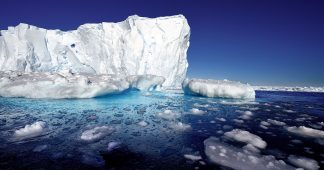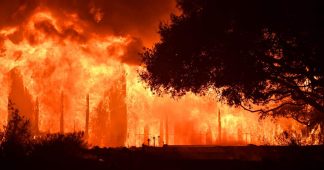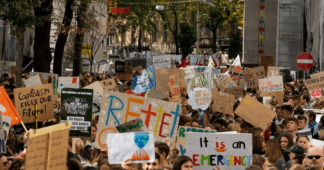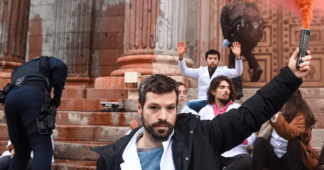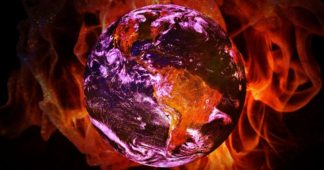“It’s not about taking our foot off the accelerator anymore—it’s about slamming on the brakes,” said one expert in response to latest U.N. assessment.
By Jessica Corbett
A United Nations report on the climate emergency—released Monday after negotiations spilled into overtime—sparked a fresh wave of calls for bolder and scientifically informed action to rapidly and dramatically reduce planet-heating emissions for the sake of all life on Earth.
“How much more destruction must we witness, and how many more scientific reports will it take, before governments finally acknowledge fossil fuels as the real culprits behind the human suffering being felt across the globe?” asked Namrata Chowdhary, head of public engagement at the advocacy group 350.org.
“As we come ever closer to the tipping points for human existence, once again scientists are sounding a clear alarm: Massive cuts in emissions are unavoidable to avert the worst,” Chowdhary added.
The new report, entitled Climate Change 2022: Mitigation of Climate Change, is the third installment from the sixth assessment of the Intergovernmental Panel on Climate Change (IPCC). Earlier analyses, released in August and February, focused on physical science and impacts, adaptation, and vulnerability, respectively. A synthesis document is forthcoming.
The analysis was produced by 278 authors from 65 nations and is based on over 18,000 papers and nearly 60,000 comments from countries and experts. The document emphasizes the need for systemic changes globally, including decarbonizing the energy sector, electrifying transportation, shifting to more plant-based diets, and restoring key ecosystems.
Watching @IPCC_CH presser now. UN Sec Gen. @antonioguterres delivers starkest warning to date. “The jury has reached a verdict and it is damning…we are on a fast track to climate disaster.” [live tweet thread{ pic.twitter.com/Y2k9zl0U8F
— Dr. Sandra Steingraber (@ssteingraber1) April 4, 2022
While there is evidence of increased climate action globally—particularly with wind and solar energy and well as electric vehicles (EVs)—the IPCC report concludes that “unless there are immediate and deep emissions reductions across all sectors, 1.5°C is beyond reach.”
Limiting global temperature rise to 1.5°C is the more ambitious goal of the Paris agreement, which also has a 2°C target and has guided global climate policies and talks since it was finalized in late 2015.
“This latest IPCC report finds that global emissions are now 54% higher than they were in 1990 and starkly points out that from 2010 to 2019, heat-trapping emissions were higher than ever and are still rising globally across all major sectors,” noted Kristina Dahl, a principal climate scientist at the Union of Concerned Scientists.
Dahl continued:
“To keep the principal goal of the Paris agreement within reach, countries will need to strengthen their national pledges and decrease global heat-trapping emissions by roughly 40% relative to 2019 levels within this decade. Because we have failed to rein in global warming emissions to date, the choices available to us are no longer ideal. In addition to deep, absolute cuts in heat-trapping emissions, some amount of these emissions will also need to be removed from the atmosphere if nations are to limit planetary warming to 1.5°C or even 2°C. Most emissions removal options, however, come with substantial, and in some cases untenable, tradeoffs. On the other hand, surpassing the 1.5°C threshold would lead to catastrophic climate impacts—with some so extreme adapting will no longer be feasible—as well as significant loss of life, property, and ecosystems in the United States and around the world. The science of climate change, its consequences, and the solutions to it could not be clearer. The ball is now in the court of world leaders and policymakers, who must act with the utmost urgency to address the global climate crisis.”
Oxfam climate policy lead Nafkote Dabi declared Monday that “this IPCC report pulls no punches. The bleak and brutal truth about global warming is this: Barring action on a sweeping scale, humanity faces worsening hunger, disease, economic collapse, mass migration of people, and unbearable heat. It’s not about taking our foot off the accelerator anymore—it’s about slamming on the brakes. A warming planet is humanity’s biggest emergency.”
Describing 1.5°C as “a survival target” that “remains within our grasp, but just barely,” Dabi highlighted the need for “a dramatic shift towards sustainable renewable energy.” While warning that ramping up fossil fuel production in response to Russia’s war on Ukraine “is shortsighted folly,” she noted that the costs of extreme weather exacerbated by human-caused global heating “are piling up” and “do not hit everyone equally.”
“People living in poverty are suffering first and worst,” Dabi explained. “Farmers in Kenya, Ethiopia, and Somalia have lost crops and entire herds of livestock to an exceptionally long and severe drought. Millions of people in East Africa are now on the brink of a hunger catastrophe. Meanwhile, the richest people who have massive carbon footprints are turning up the air-conditioning on their mega-yachts.”
“This monumental climate report is distressing but it is not surprising,” she added. “Scientists and the IPCC have been warning governments of this danger for decades. Our future lies in the decisions we make today. We cannot tackle climate change later. We must clamp down on emissions now or face more catastrophic climate disasters, season after season.”
The day's key quote comes from the UN Secretary General @antonioguterres: "Investing in new fossil fuels is moral and economic madness."
He is the closest thing that planet earth and all its inhabitants have to a spokesperson. And he is absolutely right
— Bill McKibben (@billmckibben) April 4, 2022
The campaigner’s call for action—particularly by wealthy countries most responsible for polluting the planet—was echoed by other activists and experts, including Meena Raman from Friends of the Earth Malaysia, who said that “it is a disgrace that decades of cowardly decisions by rich industrial nations have led us here, to the brink of climate catastrophe laid bare in this latest IPCC assessment report.”
“The United States in particular must accept its role in creating the climate impacts we’re experiencing right now,” Raman added. “Scientists have confirmed that much more finance must urgently flow from developed to developing countries, to enable the latter to adapt and adjust to irreparable damage from climate impacts. This funding is necessary to secure the well-being of their citizens and economies. Without it, our hard-fought progress for equity, equality, rights, and justice will unravel.”
Earthworks policy director Lauren Pagel similarly focused on the United States, declaring that “solutions to solve this crisis exist but political courage and policy creativity are lacking” and calling on President Joe Biden to “immediately declare a climate emergency to ramp down oil and gas extraction and limit its harmful methane pollution.”
Keith Slack of EarthRights International pointed out that “as governments have failed to take meaningful climate action, Indigenous and frontline communities such as the water protectors at Line 3 in Minnesota, those in the Omkoi region of Thailand, and the Macho Piro people in the Peruvian Amazon have risen to address the crisis by building a global movement to resist climate-damaging industries and denounce the inaction of world leaders.”
“The IPCC report out today reaffirms that frontline communities, Indigenous groups, and youth groups should have a seat at the table in the adoption of climate policies,” said Slack, the group’s director of strategy and campaigns. “The IPCC also acknowledges the important role of climate litigation in helping communities protect their rights in the midst of the climate crisis.”
“The main barrier to a sustainable future at this moment is that governments are not showing the political will for an energy transition and are not listening to frontline communities and everyday citizens who are demanding change,” he added.
Varshini Prakash, executive director of the U.S.-based Sunrise Movement, agreed. As she put it: “We are at a crossroads right now. Do we continue to rely on fossil fuel corporations and petrostates who are fueling war and making record profits at the expense of working families, or do we begin a mass mobilization of our government and society to transition to a renewable energy future?”
According to Prakash, “The science of the IPCC report is clear: Fossil fuels are to blame for the climate crisis, and our government’s continued support for fossil fuels at home and abroad is killing us.”
Published at www.commondreams.org
We remind our readers that publication of articles on our site does not mean that we agree with what is written. Our policy is to publish anything which we consider of interest, so as to assist our readers in forming their opinions. Sometimes we even publish articles with which we totally disagree, since we believe it is important for our readers to be informed on as wide a spectrum of views as possible.
